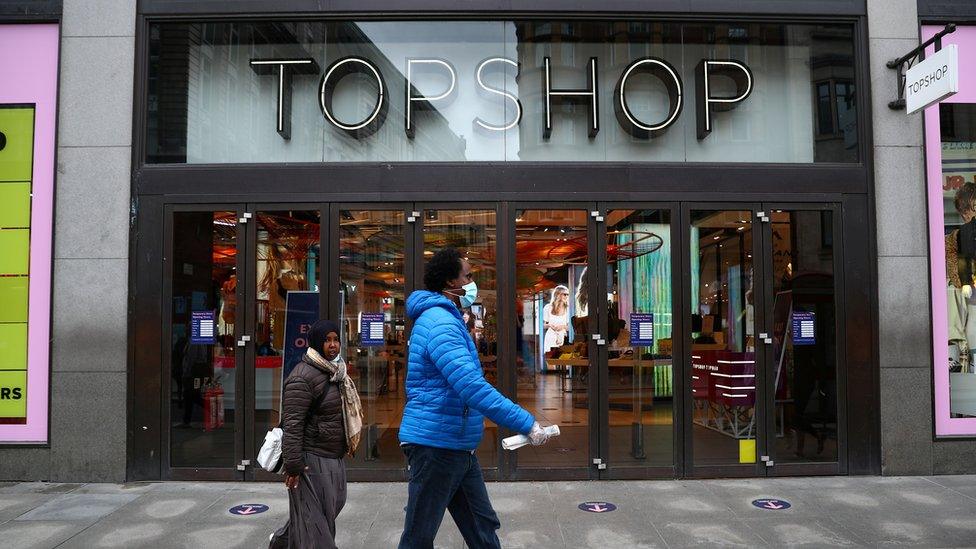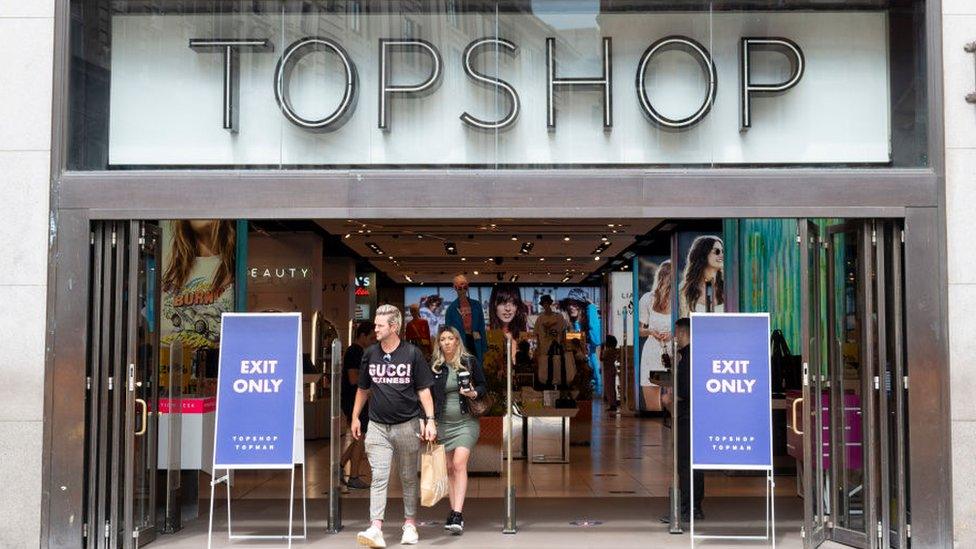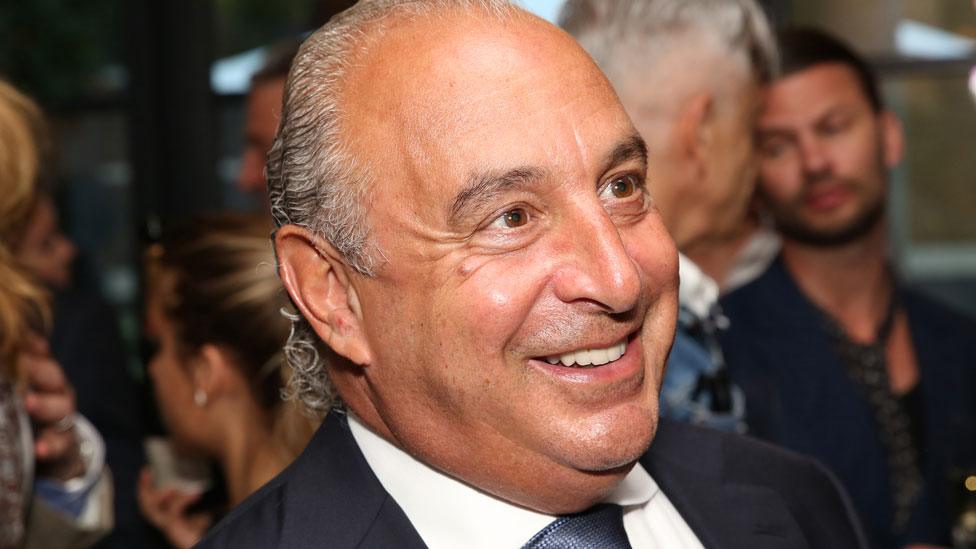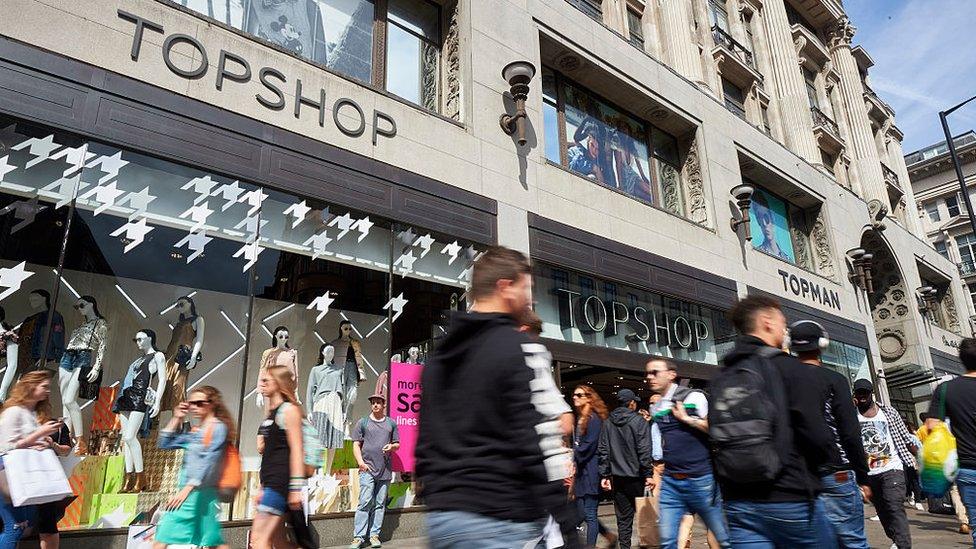Arcadia: Buyers to 'pick over carcass' of Topshop owner, says former boss
- Published

Arcadia is "an object lesson in what happens if you don't stay relevant", said Lord Rose
Breaking up the Arcadia retail empire, which includes Topshop, Burton and Dorothy Perkins, is "the only way" forward as it faces collapse, its former chief executive said.
Lord Rose, now chairman of Ocado, said "people will come and pick over the carcass" but not all the brands and infrastructure are likely to sell.
"If you aren't relevant, you're probably going to die," he said.
Administrators could be appointed on Monday, putting 13,000 jobs at risk.
Lord Rose, who was chief executive of Arcadia until it was bought by retail tycoon Sir Philip Green in 2002, said the company had been "caught out" by the "relentless pace of change" in retail, which was only made worse by the Covid-19 crisis.
"Sadly what will happen is people will come and pick over the carcass," he told BBC Radio 4's Today programme, adding that there were "some tastier bits of the carcass" - such as Topshop - and "some less tasty bits of the carcass".
"I just hope that someone will pick up some of the pieces, that some jobs are salvageable," he said.
Arcadia would be the biggest British corporate collapse of the pandemic if it enters voluntary liquidation, analysts said.
They said that if a large part of its 500 shops were forced to close, it would hollow out a huge swathe of the UK High Street.
But the shops are expected to continue to trade if administrators are called in, as buyers are sought for the company or its individual brands.
Lord Rose said he did not want to "demonise" Sir Philip, but said the controversial businessman had "not moved from an analogue world to a digital world fast enough", blaming that on a likely lack of investment over 10 or 15 years.
Monaco, models and money – who is retail mogul Sir Philip Green?
"It's a very, very tough place out there in the retail high street at the moment," said Lord Rose, who also led Marks & Spencer for more than six years.
"There is very little room for manoeuvre, we've got a whole load of pressures in the sector and I'm afraid if you aren't relevant, you're probably going to die."
BBC business editor Simon Jack said that while Topshop is deemed to have some value as a brand, insiders are less optimistic about the appeal of Wallis Evans, Dorothy Perkins and Burton to buyers.
Mike Ashley, founder of Sports Direct and owner of House of Fraser, has been suggested as one possible buyer for some of the brands, he said.
According to a report from Sky News, external, Mr Ashley's Frasers Group offered a £50m loan to Arcadia on Saturday.
But the BBC understands that Arcadia has not yet received a direct approach and a source close to the situation described the offer as a "non-starter".
If part or all of the company is sold, the proceeds would be likely to end up in the Arcadia pension fund, which is hundreds of millions of pounds in deficit and would have a priority claim on the company's assets.
Lord Rose said Arcadia teetering on the brink of collapse was jut one aspect of a "sector-wide malaise that's been accelerated by the problems with Covid".
There are forecasts of 20,000 shops closing and 250,000 retail jobs being lost, he said.
Menswear retailer Moss Bros launched a restructuring of its business on Friday and earlier this month fashion chains Peacocks and Jaeger were placed into administration after owner Edinburgh Woollen Mill Group failed to find a buyer.
"If we don't get back to normality we're going to have more than 2.5m people unemployed, we're going to have really difficult times on the high street, and that is a real, real problem," Lord Rose said.
Casting a shadow
Retail consultant Kate Hardcastle said Arcadia's brands had been "suffering for years through under-investment" while paying out large dividends.
She told the BBC that store closures could have a "knock-on effect" which "casts a shadow" on other high street retailers by reducing the overall footfall.
The future of the Arcadia brands is in developing an e-commerce presence "rather than just bricks-and-mortar stores", Ms Hardcastle said.
Arcadia has acknowledged that the pandemic had "a material impact on trading across our businesses".
Sir Philip had been in talks with potential lenders about borrowing £30m to help the business get through Christmas.
Those talks collapsed and the company said it was "working on a number of contingency options to secure the future of the group's brands".
But Arcadia had also been struggling against online competition from companies such as Asos, Boohoo and Pretty Little Thing, as well as high street brands such as Zara which have invested heavily in their digital business.
In its most recent accounts for the year to 1 September 2018, Arcadia reported a £93.4m pre-tax loss compared with a £164.6m profit in the previous 12 months.
It also said sales fell 4.5% to £1.8bn.



Are you an Arcadia employee? Share your experiences by emailing haveyoursay@bbc.co.uk, external.
Please include a contact number if you are willing to speak to a BBC journalist. You can also get in touch in the following ways:
WhatsApp: +44 7756 165803
Tweet: @BBC_HaveYourSay, external
Please read our terms & conditions and privacy policy
If you are reading this page and can't see the form you will need to visit the mobile version of the BBC website to submit your question or comment or you can email us at HaveYourSay@bbc.co.uk, external. Please include your name, age and location with any submission.
- Published27 November 2020

- Published27 November 2020

- Published22 November 2020
